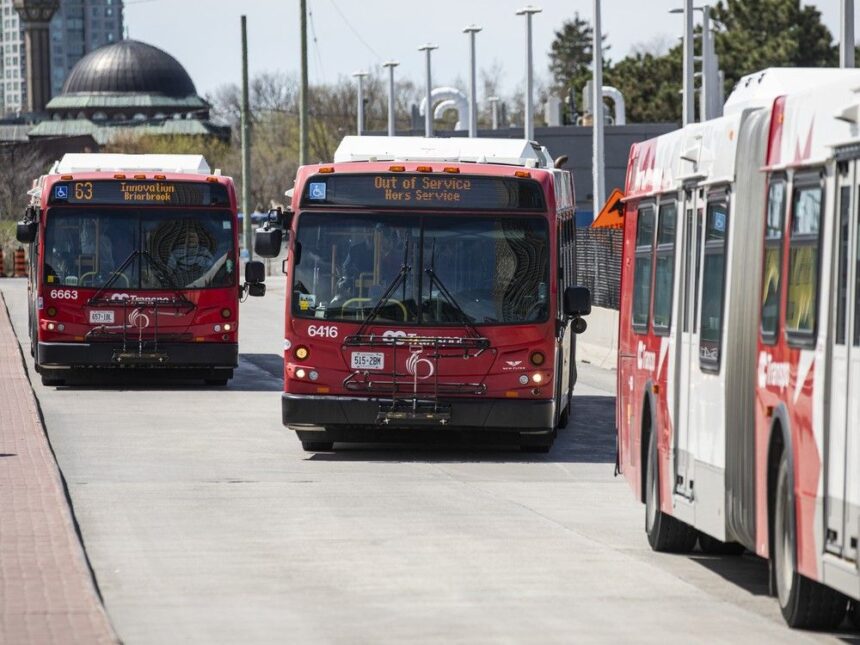The recent announcement that OC Transpo is pulling the plug on text message notifications for bus cancellations has sparked concern among regular transit users across Ottawa. Starting October 1, the transit agency will no longer send SMS alerts about cancelled bus trips, pushing riders toward other notification methods.
I spoke with several commuters at Tunney’s Pasture station yesterday morning, where the frustration was palpable. “I don’t always have data on my phone, and the texts were reliable,” said Janet Morris, 67, who relies on the #16 bus to visit her doctor weekly. “Not everyone has a fancy smartphone or knows how to use all these apps.”
The change comes as OC Transpo attempts to streamline its customer communication systems. According to transit officials, riders can still receive cancellation information through the OC Transpo website, official mobile app, station display screens, and through third-party apps like Transit and Google Maps.
Transit Services General Manager Renée Amilcar explained in a statement that this shift aims to “modernize the customer experience” while reducing operational costs. However, this modernization approach has raised accessibility concerns.
City Councillor Riley Brockington told me that several constituents have already contacted his office with concerns. “Many seniors and low-income residents still use basic phones without data plans. This change potentially leaves our most vulnerable transit users in the dark,” Brockington said.
The SMS notification system, introduced in 2018, currently serves approximately 14,000 subscribers according to OC Transpo data. The service sends out roughly 5,000 messages daily during periods of significant service disruptions.
Ottawa’s transit system has faced persistent reliability challenges in recent years. Last winter alone, OC Transpo recorded over 8,700 trip cancellations, with many attributed to vehicle maintenance issues and operator shortages. These frequent disruptions made the text notification system a critical tool for many commuters.
Community advocate Sarah Jennings from Ottawa Transit Riders expressed disappointment with the decision. “We’ve seen the transit commission push digital solutions without considering the digital divide in our city. Not everyone has a smartphone, reliable data, or the technical skills to navigate multiple apps,” Jennings said.
For those without smartphones, OC Transpo suggests calling their customer service line at 613-560-5000. However, during my visits to three major transit hubs yesterday, many riders expressed doubt about the practicality of this alternative.
“Who has time to call and wait on hold while standing at a bus stop in February?” questioned University of Ottawa student Miguel Rodriguez. “The text system wasn’t perfect, but at least I knew immediately if my bus wasn’t coming.”
OC Transpo has faced budget pressures since the pandemic drastically reduced ridership. Recent figures show weekday ridership hovering around 70 percent of pre-pandemic levels, creating significant revenue shortfalls. The elimination of the SMS service is expected to save approximately $110,000 annually.
While attending yesterday’s Transit Commission meeting, I noticed the issue wasn’t extensively discussed despite its impact on thousands of daily riders. When pressed, transit officials emphasized that the SMS technology was “becoming outdated” and required “costly upgrades.”
Accessibility advocate Morgan Williams disagrees with this reasoning. “Text messaging is one of the most universal and accessible communication tools we have. It works on virtually any phone, requires minimal technical knowledge, and functions even in areas with poor data coverage,” Williams told me after the meeting.
For those looking to prepare for the October 1 transition, OC Transpo recommends downloading their official app or registering for email alerts through their My Alerts program on octranspo.com.
As Ottawa continues its push toward becoming a more connected smart city, this change highlights the ongoing tension between digital innovation and ensuring services remain accessible to all residents regardless of technical ability or economic status.
Walking through Bayview Station this morning, I couldn’t help but







